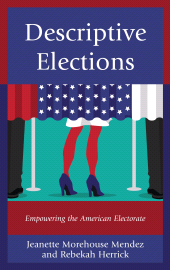Descriptive Elections : Empowering the American Electorate
162 p.
Elections are in trouble with general low levels of interest and turnout; Jeanette Morehouse Mendez and Rebekah Herrick suggest that if candidates looked more like America does, these problems would decrease. They call these elections where candidates differ in key social demographic traits descriptive elections. They predict that races that have candidates of different race and/or gender will see higher voter turnout out, because voters will be more interested in these races and will have less alienation and indifference. In addition, they predict that voters' stereotypes/gender preferences, as well as elite behavior, can contribute to greater voter engagement. They also predict that campaigns in these elections will discuss a wider variety of issues, and the media will do likewise. They test their expectations by examining the gender mix of candidates in gubernatorial, congressional, and state legislative races. The results suggest that voters in mixed-gender and women-only elections
have less alienation, less indifference, and greater interest. They also are more likely to vote. The results offer more modest evidence that campaigns and media coverage differ in these races. Thus the authors conclude that voters' gender stereotypes and preferences have a larger effect on voters' engagements in descriptive elections. [Publisher's Text]
-
Informations
ISBN: 9798216336280
DISCIPLINES


